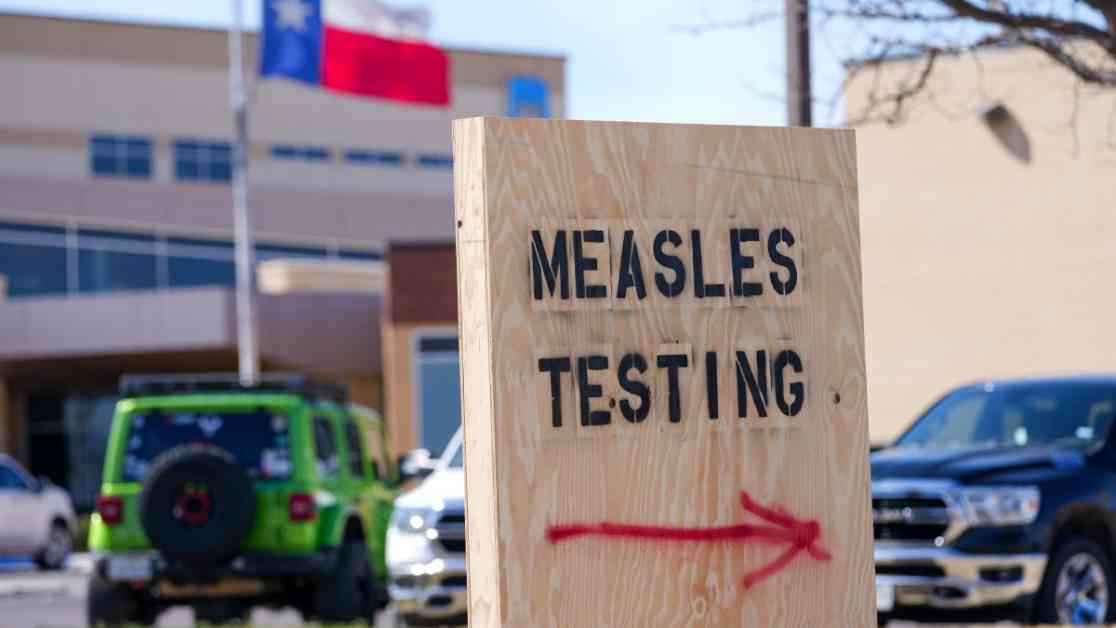Measles Outbreaks in Texas and New Mexico: A Growing Concern
The recent surge in measles cases across rural West Texas and eastern New Mexico has sparked widespread alarm, with the tally climbing to 90 infections in seven Texas counties and nine cases in New Mexico. The outbreak has left 16 individuals hospitalized, shedding light on the urgent need for public awareness and preventive measures to curb the spread of this highly contagious disease.
Measles Spreading Across West Texas and Eastern New Mexico
In West Texas, Gaines County remains the epicenter of the outbreak, reporting a staggering 57 cases, while Terry County to the north has confirmed 20 infections. The tally extends to Dawson County with six cases, Yoakum County with four, and Lubbock, Lynn, and Ector counties, each with a single case. Notably, the Texas state health department data reveals that the majority of cases affect individuals under 18 years, with 26 cases in children under 4 and 51 in children aged 5-17. Additionally, ten adults have contracted measles, while three cases are pending age confirmation. The outbreak is particularly pronounced in the Mennonite community, reflecting clustering among undervaccinated populations, especially in families attending small private religious schools or being homeschooled.
Moving across the border to New Mexico, all reported cases are confined to Lea County, which shares its border with Gaines County in Texas. Exposure sites in New Mexico include a grocery store, an elementary school, a church, Nor-Lea Hospital, and a Walgreens in Hobbs. The proximity of these outbreaks underscores the need for heightened vigilance and coordinated public health responses.
Understanding Measles: Risks and Prevention
Measles, a respiratory virus, can linger in the air for up to two hours, making it highly transmissible. The U.S. Centers for Disease Control and Prevention estimates that up to 90% of susceptible individuals may contract the virus upon exposure. While most children recover from measles, the infection can lead to severe complications such as pneumonia, blindness, brain swelling, and even death.
The measles, mumps, and rubella (MMR) vaccine stands as a safe and effective preventive measure against measles infection and its associated risks. Administered in two doses, the first shot is recommended for children between 12 and 15 months, with the second dose between 4 and 6 years. The vaccine series is mandated for children entering kindergarten in public schools nationwide, underscoring its critical role in preventing outbreaks. Despite unfounded claims linking vaccines to autism, extensive research has debunked such myths, emphasizing the vital importance of vaccination in safeguarding public health.
Renowned health authorities, including Sen. Bernie Sanders, have echoed the urgent need for vaccination to bolster herd immunity and shield communities from preventable diseases like measles. Childhood vaccination rates are crucial in maintaining public health resilience, with higher rates above 95% offering robust protection against outbreaks. However, the rise in vaccine exemptions due to religious or personal beliefs poses a significant challenge in upholding herd immunity, as witnessed in recent outbreaks across the country.
Combatting the Outbreak: Public Health Initiatives
In response to the escalating measles outbreak, health workers are ramping up vaccination clinics and educational campaigns in Texas to raise awareness about the importance of immunization. Collaborative efforts with schools and community organizations are instrumental in disseminating accurate information and promoting vaccine uptake among vulnerable populations. Similarly, New Mexico health officials are spearheading vaccination drives in Hobbs to contain the spread and protect residents from measles.
As the battle against measles intensifies, vigilance, community engagement, and evidence-based interventions are crucial in curbing outbreaks and safeguarding public health. By fostering a culture of vaccination and proactive health practices, communities can fortify their defenses against infectious diseases and pave the way for a healthier, resilient future.
___
The Associated Press Health and Science Department receives support from the Howard Hughes Medical Institute’s Science and Educational Media Group and the Robert Wood Johnson Foundation. The AP is solely responsible for all content.


